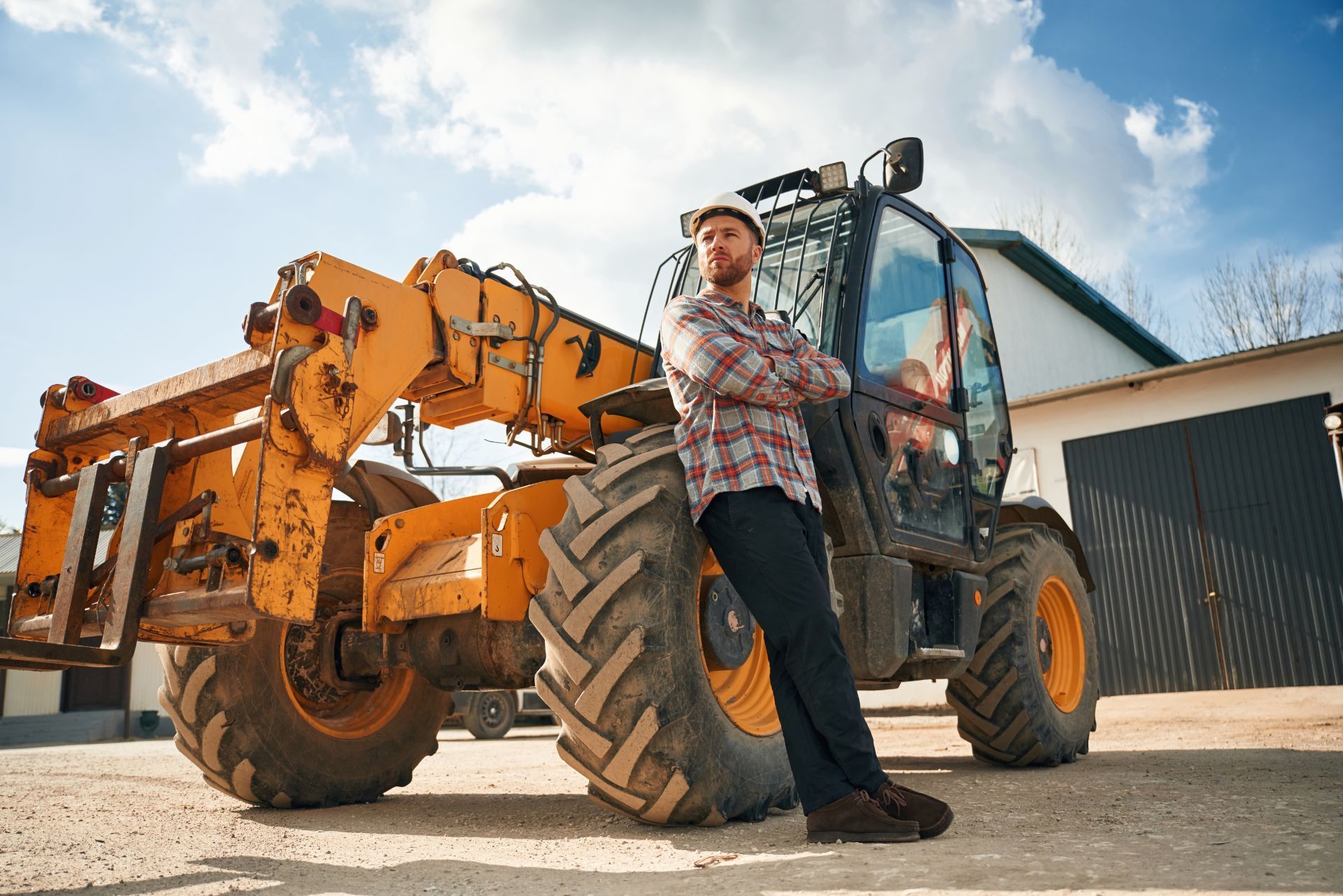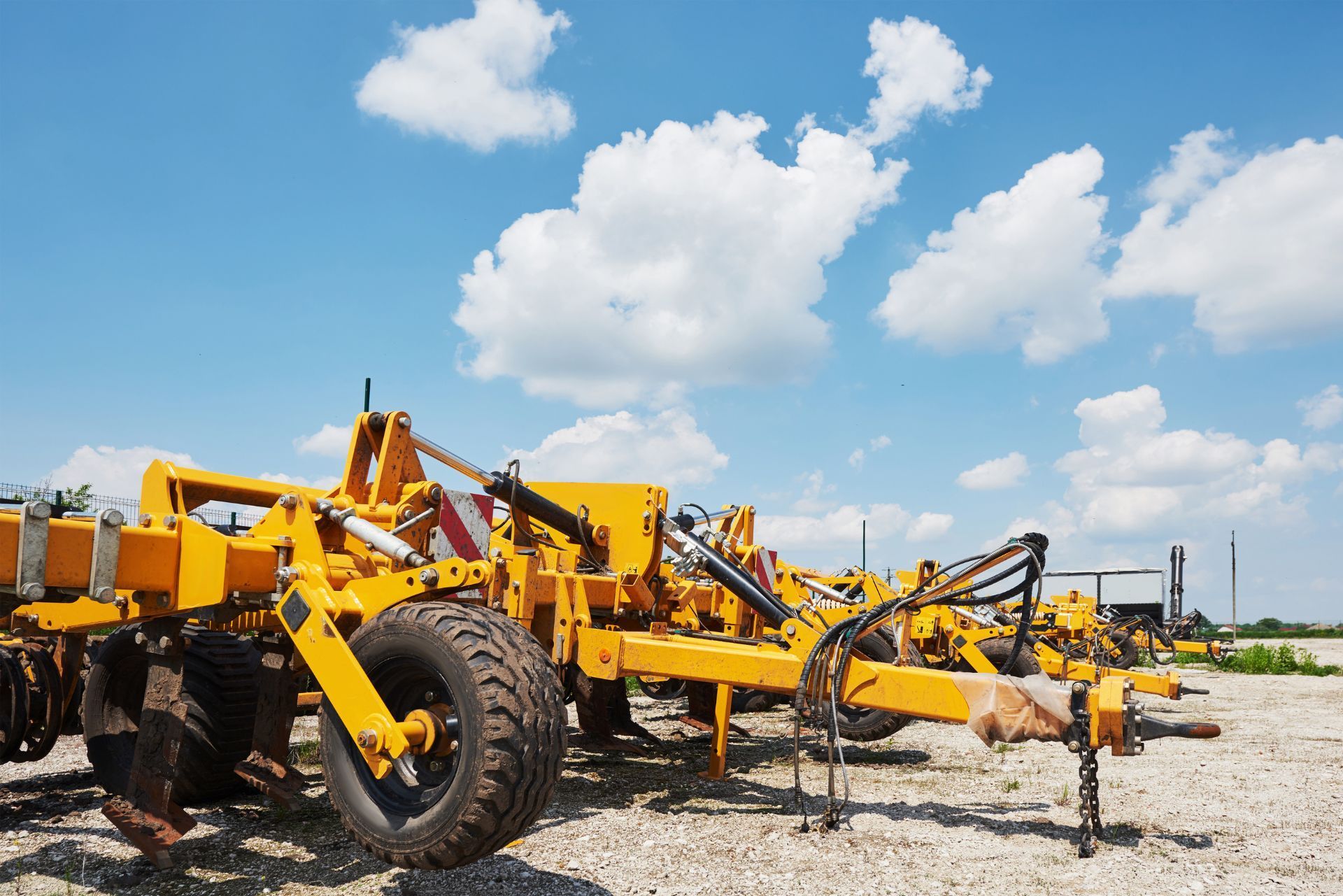Arizona Equipment Dealers Insurance
See How We're Different:
or Call Us:(480) 526-3222

Most Common Business Policies
Index
Contact Us
In the bustling world of equipment dealerships, having the right insurance coverage is crucial. Arizona equipment dealers face unique challenges and risks, making it essential to understand the various insurance options available to protect their businesses. This article provides a comprehensive overview of Arizona equipment dealers insurance, covering everything from types of coverage to specific considerations for the state.
Understanding Equipment Dealers Insurance
Equipment dealers insurance is a specialized form of coverage designed to protect businesses that sell, rent, or service equipment. This insurance can encompass a variety of policies tailored to the specific needs of equipment dealers. Understanding the fundamentals of this insurance is the first step in safeguarding a dealership.
What is Equipment Dealers Insurance?
Equipment dealers insurance is a broad term that encompasses several types of coverage, including general liability, property insurance, and specialized policies for equipment. These policies are designed to protect against risks such as property damage, theft, liability claims, and more. Each type of coverage plays a critical role in ensuring the financial stability of a dealership. For example, property insurance can cover the physical assets of the dealership, such as buildings and inventory, while general liability insurance protects against claims arising from injuries or damages that occur on the dealership's premises.
Why is Insurance Important for Equipment Dealers?
In the equipment dealership industry, the stakes are high. A single incident, such as a theft or an accident involving a piece of equipment, can lead to significant financial losses. Insurance serves as a safety net, allowing dealers to manage risks effectively. Furthermore, having adequate insurance is often a requirement for securing financing or leasing agreements, making it a vital component of business operations. Additionally, insurance can enhance a dealership's reputation, as customers are more likely to trust a business that is adequately insured, knowing that they are protected in case of unforeseen events.
Common Risks Faced by Equipment Dealers
Equipment dealers encounter a variety of risks that can impact their operations. These include physical damage to equipment, liability claims from customers, and even risks associated with the transportation of equipment. Understanding these risks is essential for selecting the appropriate insurance coverage. For instance, a dealership that offers rental equipment may face different risks than one that primarily sells new machinery. Moreover, the nature of the equipment being dealt with—be it heavy machinery, construction tools, or agricultural equipment—can also dictate the specific types of coverage needed. For example, high-value items may require additional coverage limits to ensure they are fully protected against theft or damage during transit.
In addition to these risks, equipment dealers must also be aware of the potential for product liability claims. If a piece of equipment malfunctions and causes injury or property damage, the dealer could be held liable, even if they were not directly involved in the manufacturing of the product. This underscores the importance of having comprehensive insurance that not only covers the dealership's operations but also extends to the products sold. Additionally, seasonal fluctuations in demand can impact cash flow, making it crucial for dealers to have coverage that can adapt to their changing needs throughout the year.

Types of Coverage Available
Arizona equipment dealers have access to a range of insurance products designed to address their unique needs. Each type of coverage serves a specific purpose and can be tailored to fit the individual requirements of a dealership.
General Liability Insurance
General liability insurance is a fundamental coverage for any business, including equipment dealers. This policy protects against claims of bodily injury or property damage that may occur on the dealership premises or as a result of business operations. For example, if a customer is injured while inspecting equipment, general liability insurance would cover the associated legal costs and any settlements. Additionally, this coverage can also extend to incidents that occur off-site, such as during a demonstration at a construction site, ensuring that dealers are protected no matter where their business takes them.
Property Insurance
Property insurance is crucial for protecting the physical assets of an equipment dealership. This includes coverage for the dealership's buildings, inventory, and equipment. In Arizona, where natural disasters such as wildfires can pose a risk, having robust property insurance is essential. This coverage can help dealers recover from losses due to theft, vandalism, or catastrophic events. Furthermore, many property insurance policies also offer business interruption coverage, which can be invaluable if a dealership has to halt operations due to a covered loss. This ensures that dealers can maintain their financial stability even in the face of unexpected challenges.
Commercial Auto Insurance
For equipment dealers that use vehicles for transporting equipment,
commercial auto insurance is a must. This policy covers damages resulting from accidents involving dealership vehicles and can also provide coverage for liability claims arising from these incidents. In Arizona, where road conditions can vary, having comprehensive auto insurance is critical for protecting both the dealership and its employees. Moreover, this coverage can often be customized to include additional features such as roadside assistance and rental reimbursement, which can further enhance a dealership's operational efficiency and peace of mind during unforeseen circumstances.
Beyond the standard insurance policies, Arizona equipment dealers may benefit from specialized coverage options that cater specifically to their industry. These policies can provide additional protection against unique risks that are not covered by traditional insurance. With the rapid advancements in technology and the increasing complexity of equipment, having tailored insurance solutions is becoming more crucial for dealers who want to safeguard their investments and ensure business continuity.
Equipment Breakdown Insurance
Equipment breakdown insurance covers the costs associated with the repair or replacement of equipment that fails due to mechanical issues. This type of coverage is particularly important for dealers who rely on machinery for their operations. In Arizona, where extreme temperatures can affect equipment performance, having this coverage can prevent significant financial losses. Additionally, the policy often extends to include losses incurred from spoiled inventory or interrupted services, which can be a critical factor for dealers who manage perishable goods or time-sensitive projects.
Business Interruption Insurance
Business interruption insurance is designed to cover lost income and operating expenses if a dealership must close temporarily due to a covered event, such as a fire or natural disaster. This coverage can be a lifesaver for dealers who face disruptions, allowing them to maintain financial stability while they recover. Furthermore, this insurance can also include coverage for additional expenses incurred during the recovery period, such as temporary relocation costs or increased operating expenses, ensuring that dealers can navigate through tough times without incurring crippling debt.
Errors and Omissions Insurance
Errors and omissions insurance, also known as professional liability insurance, protects equipment dealers against claims of negligence or inadequate work. For instance, if a customer alleges that a piece of equipment sold was misrepresented, this coverage can help cover legal fees and settlements. In a competitive market, having this protection can bolster a dealer's reputation and financial security. Moreover, this type of insurance can also provide peace of mind, allowing dealers to focus on their core business operations without the constant worry of potential legal repercussions from dissatisfied customers or miscommunications during the sales process.
Cyber Liability Insurance
In today's digital age, cyber liability insurance is becoming increasingly important for equipment dealers who manage sensitive customer information and financial transactions online. This coverage protects against data breaches, hacking, and other cyber threats that could compromise customer data or disrupt business operations. Given the growing reliance on technology for inventory management and customer relations, having robust cyber liability insurance can safeguard a dealer's reputation and financial health in the event of a cyber incident. Additionally, many policies also offer resources for risk management and response planning, helping dealers to proactively mitigate potential threats before they escalate into serious issues.
Factors Influencing Insurance Costs
The cost of insurance for equipment dealers in Arizona can vary significantly based on several factors. Understanding these factors can help dealers make informed decisions when selecting coverage.
Type of Equipment and Inventory
The type and value of equipment a dealership sells or rents can greatly influence insurance premiums. High-value machinery may require more extensive coverage, leading to higher costs. Additionally, the nature of the equipment—whether it is heavy machinery, construction tools, or agricultural equipment—can also affect pricing due to varying risk levels associated with different types of equipment. For instance, heavy construction machinery often has a higher risk of accidents and damage, which can contribute to increased premiums. Dealers should also consider the depreciation of equipment, as older machinery may have lower replacement costs, potentially impacting the overall insurance strategy.
Location and Risk Factors
The geographical location of a dealership plays a crucial role in determining insurance costs. Areas prone to natural disasters, such as wildfires or floods, may face higher premiums. Additionally, dealerships located in urban areas may encounter higher risks of theft or vandalism, further impacting insurance rates. Understanding local risk factors is essential for accurately assessing insurance needs. For example, dealerships situated near major highways might experience more accidents, while those in remote areas may have fewer risks but could face challenges in obtaining timely repairs or replacements. Furthermore, local regulations and building codes can also influence insurance costs, as compliance with safety standards may reduce risk and potentially lower premiums.
Claims History
A dealership's claims history can significantly influence insurance premiums. If a business has a history of frequent claims, insurers may view it as a higher risk, resulting in increased rates. Conversely, a clean claims history can lead to lower premiums. Dealers should be proactive in managing risks and minimizing claims to keep insurance costs manageable. Implementing safety training programs for employees and conducting regular equipment maintenance can help reduce the likelihood of accidents. Additionally, some insurers offer discounts for businesses that adopt risk management practices, further incentivizing dealers to invest in safety measures. By fostering a culture of safety and accountability, dealerships can not only protect their assets but also create a more favorable environment for negotiating insurance terms.

Choosing the Right Insurance Provider
Selecting the right insurance provider is a critical decision for Arizona equipment dealers. A reputable insurer can make a significant difference in the level of service and coverage provided.
Researching Insurance Companies
Before choosing an insurance provider, it is essential to conduct thorough research. This includes reading reviews, checking ratings from organizations like A.M. Best, and seeking recommendations from industry peers. A well-established insurer with experience in the equipment dealership sector can offer valuable insights and tailored coverage options. Additionally, it may be beneficial to explore the insurer's financial stability and claims handling process. Understanding how quickly and efficiently a company processes claims can provide peace of mind, especially in the event of an unexpected incident.
Understanding Policy Terms and Conditions
When reviewing insurance policies, it is crucial to understand the terms and conditions. This includes knowing what is covered, what is excluded, and any limits on coverage. Dealers should ask questions and seek clarification on any points of confusion to ensure they fully understand their policy. Furthermore, it is wise to consider the implications of deductibles and co-pays, as these can affect the overall cost of coverage. Some policies may also offer optional endorsements or riders that can enhance coverage, such as protection against equipment breakdown or loss of income due to business interruption, which could be vital for maintaining operations during challenging times.
Working with an Insurance Agent
Engaging with an experienced insurance agent can be beneficial for equipment dealers. An agent can help navigate the complexities of insurance, assess specific needs, and recommend appropriate coverage options. Additionally, an agent can assist in comparing quotes from multiple providers, ensuring that dealers find the best coverage at a competitive price. They can also provide ongoing support, helping dealers stay informed about changes in the insurance landscape or new products that may better suit their evolving needs. Regular check-ins with an agent can ensure that the coverage remains adequate as the business grows or changes, avoiding potential gaps in protection that could lead to significant financial repercussions.
Compliance and Regulatory Considerations
Arizona equipment dealers must also be aware of compliance and regulatory requirements related to insurance. Understanding these regulations is essential for operating legally and avoiding potential penalties.
State Regulations for Equipment Dealers
Arizona has specific regulations governing equipment dealerships, including licensing and insurance requirements. Dealers are often required to carry certain types of insurance, such as general liability, to operate legally. Familiarizing oneself with these regulations is crucial for maintaining compliance and protecting the business.
Impact of Federal Regulations
In addition to state regulations, federal laws may also apply to equipment dealers, particularly those involved in interstate commerce. Understanding federal regulations related to transportation and safety can help dealers ensure compliance and avoid legal issues. This may include adhering to safety standards set by agencies such as the Occupational Safety and Health Administration (OSHA).
Tips for Managing Insurance Costs
While insurance is a necessary expense for equipment dealers, there are strategies to manage costs effectively. Implementing these tips can help dealers maintain adequate coverage without breaking the bank.
Regularly Review Insurance Policies
Regularly reviewing insurance policies is essential for ensuring that coverage remains adequate as the business evolves. As inventory changes or the dealership expands, it may be necessary to adjust coverage levels. Annual reviews can help identify gaps in coverage or opportunities for cost savings.
Implement Risk Management Strategies
Implementing effective risk management strategies can help reduce the likelihood of claims, ultimately lowering insurance costs. This may include training employees on safety protocols, maintaining equipment properly, and implementing security measures to prevent theft. A proactive approach to risk management can lead to significant savings on insurance premiums.
Consider Bundling Policies
Many insurance providers offer discounts for bundling multiple policies, such as general liability and property insurance. By consolidating coverage with a single insurer, dealers may be able to save money while ensuring comprehensive protection. It’s worth discussing bundling options with an insurance agent to explore potential savings.
Conclusion
In conclusion, Arizona equipment dealers face a unique set of challenges that necessitate comprehensive insurance coverage. Understanding the various types of insurance available, the factors influencing costs, and the importance of compliance is crucial for protecting a dealership’s assets and ensuring its long-term success.
By carefully selecting the right insurance provider, regularly reviewing policies, and implementing effective risk management strategies, equipment dealers can navigate the complexities of insurance with confidence. With the right coverage in place, dealers can focus on what they do best—providing quality equipment and service to their customers.
As the equipment dealership landscape continues to evolve, staying informed about insurance options and industry trends will remain essential for success. By prioritizing insurance and risk management, Arizona equipment dealers can safeguard their businesses against unforeseen challenges and thrive in a competitive market.
